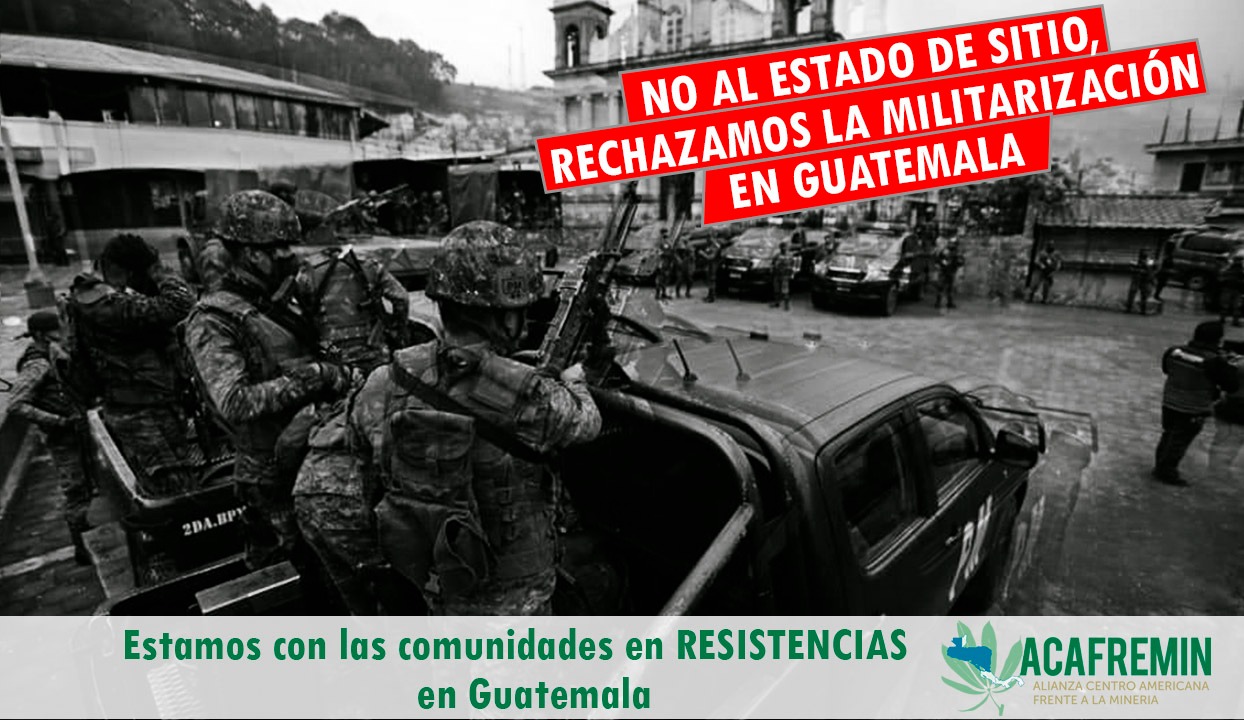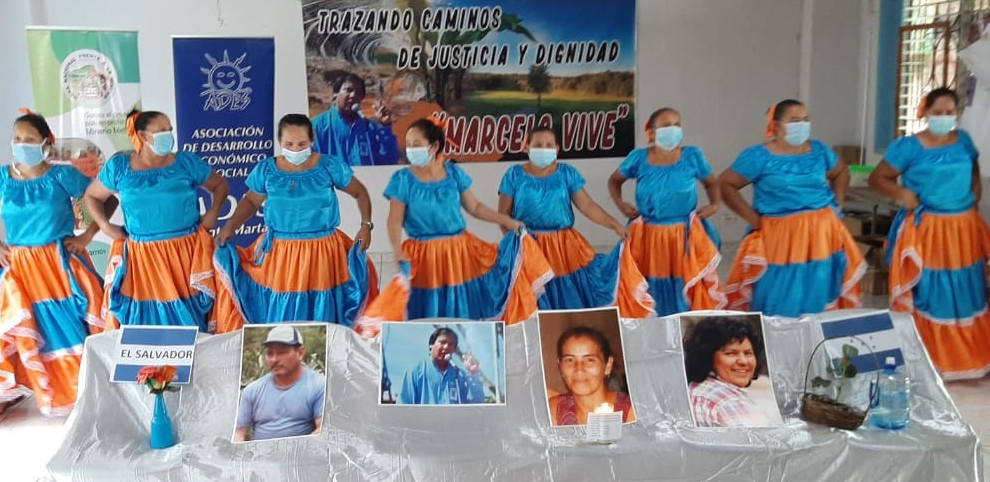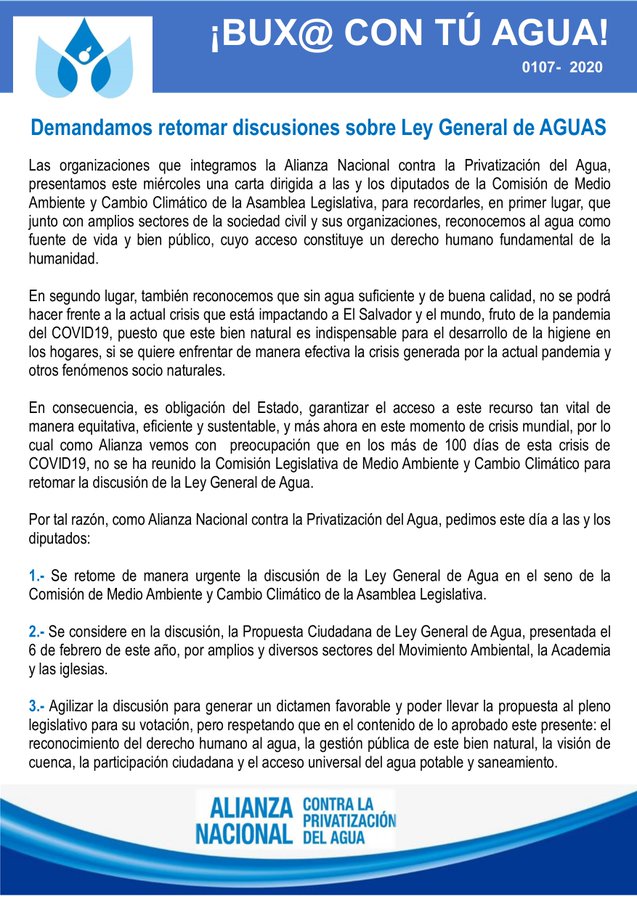- Details
-
Category: FTAs & ISDS
-
Published: Thursday, 23 July 2020 16:29
By Manuel Perez Rocha - Foreign Policy in Focus
Wealthy corporations may use trade courts to keep public health measures from cutting into their profits.
 The country was in freefall. Formerly middle class families were hawking their valuables on the street. After dark, the most desperate would search through garbage cans for food.
The country was in freefall. Formerly middle class families were hawking their valuables on the street. After dark, the most desperate would search through garbage cans for food.
That was Argentina in 2002. In that dark hour, as Argentine officials scrambled to lessen the pain of a deep economic crisis on average citizens, the last thing they needed was a barrage of corporate lawsuits. But that’s what they got.
Read more ...
- Details
-
Category: Mining and Human Rights
-
Published: Wednesday, 22 July 2020 20:21
Aldo Orellana Lopez
Terra Justa
 We supported allies DHUMA to submit questions about Anglo American's Peruvian operations to their online AGM in May 2020. Their responses left much to be desired.
We supported allies DHUMA to submit questions about Anglo American's Peruvian operations to their online AGM in May 2020. Their responses left much to be desired.
The annual shareholder meeting of London-registered mining giant Anglo American took place behind closed doors on May 5th 2020. The company is the owner of the Quellaveco copper mine in the Moquegua region of southern Peru, scheduled to begin operations in 2022. As members of London Mining Network, and together with colleagues from DHUMA (Human Rights and the Environment) in Puno, we helped to submit a series of questions to their annual shareholder meeting regarding the impacts of the Quellaveco mine on local water sources and communities, as well as the actions of the company during the COVID-19 pandemic. The company published written replies to our questions soon after. Below is our short analysis of the company’s predictable and unsatisfactory responses.
On water consumption and hydrological imbalance. One of the main observations regarding the Quellaveco project has to do with the high water consumption that the operation projects (22 million m3 of freshwater per year). Added to this are the potential impacts that the construction of the project and the extraction of water for its operations could have on the hydrological balance of the region.
Read more ...
- Details
-
Category: Regional News
-
Published: Wednesday, 22 July 2020 17:41
Jody García - Nómada
 In the three days of the state of siege in five municipalities in the north-east of Guatemala, actions have already been filed in the Constitutional Court. The intent of these actions is to stop the state of siege due to concerns about abuses against the resisting communities. Guatemalan Governance is signaling milestones in the fight against drug trafficking.
In the three days of the state of siege in five municipalities in the north-east of Guatemala, actions have already been filed in the Constitutional Court. The intent of these actions is to stop the state of siege due to concerns about abuses against the resisting communities. Guatemalan Governance is signaling milestones in the fight against drug trafficking.
Sunday, July 19th, Government Decree 14-2020 was published, which establishes a state of siege in the municipalities of El Estor, Morales, and Livingston, in the department of Izabal; and Panzós and Santa Catarina la Tinta, in the department of Alta Verapaz.
The government's justification for decreeing the state of Siege is that the presence of organized crime groups carrying out illicit activities such as drug trafficking, illegal migration, contraband, among others, has been detected in the aforementioned municipalities.
As expressed in the press release from the government of Alejandro Giammattei, “the actions of these organized crime groups have caused the loss of jobs, the execution of multiple crimes against people and their property. Moreover, these actions intend to turn the region into an area controlled by criminals”.
Read more ...
- Details
-
Category: Regional News
-
Published: Monday, 20 July 2020 15:17
ACAFREMIN
 125 national and international organizations rejected the state of siege imposed by the President of Guatemala, Alejandro Giammattei. Executive decree 13-2020 restricts mobility and demonstration rights. In addition, this decree allows arrests and interrogations without warrants or any sort of justification.
125 national and international organizations rejected the state of siege imposed by the President of Guatemala, Alejandro Giammattei. Executive decree 13-2020 restricts mobility and demonstration rights. In addition, this decree allows arrests and interrogations without warrants or any sort of justification.
The new measures will be implemented in the municipalities of El Estor, Livingston, and Morales in the municipality of Izabal, and Santa Catalina La Tinta and Panzós in the municipality of Alta Verapaz.
According to community leaders, the president's actions constitute measures of militarization, repression, and violation of human rights against the people of the aforementioned communities. The community leaders also assured that for no reason it is justifiable to establish curfews and controls restricting the constitutional rights of the population.
Read more ...
- Details
-
Category: Pacific Rim/OceanaGold
-
Published: Wednesday, 15 July 2020 17:02
P. Cabezas

On July 11th, environmental justice activists in El Salvador commemorated the 11th anniversary of the 2009 assassination of Marcelo Rivera, a community cultural activist and water defender from the small town of San Isidro, Cabañas, who died due to his relentless opposition to the El Dorado mining project, owned by Canadian Pacific Rim/Oceana Gold mining company.
The death of Marcelo, whose body was found inside an abandoned water well with signs of torture reminiscing of the brutality of the Salvadorian civil war, sent shock waves through the national and international anti mining movement and a clear message to local water defenders that pro-mining interests were willing to go beyond typical criminalization tactics to have the mining project up and running. But far from intimidating anti mining activists, Marcelo´s murder galvanized an international movement led by local communities determined to push the company out of Cabañas, have the World Bank rule in favor of El Salvador in a lawsuit brought forwards by Pacific Rim, and have El Salvador set up an example around the work as the first country to completely ban metal mining activities in its territory.
Read more ...
- Details
-
Category: Regional News
-
Published: Friday, 03 July 2020 17:30
Twitter
 This Wednesday, July 1st, the organizations that make up the National Alliance against the Privatization of Water, presented a letter addressed to the deputies of the Committee on the Environment and Climate Change of the Legislative Assembly.
This Wednesday, July 1st, the organizations that make up the National Alliance against the Privatization of Water, presented a letter addressed to the deputies of the Committee on the Environment and Climate Change of the Legislative Assembly.
The objective of the letter was to remind the deputies of the Committee that, together with broad sectors of civil society and its organizations, the organizations part of the Alliance recognize water as a source of life and a public good, whose access constitutes a fundamental human right of humanity.
Secondly, the organizations part of the Alliance also recognize that without sufficient and good quality water, the current pandemic crisis due to COVID-19 impacting El Salvador and the world will not be addressed properly.
Since this natural asset is essential for the development of hygiene in homes, if one wants to effectively face the crisis generated by the current pandemic and other socio-natural phenomena water must be ensured in sufficient and good quality.
Read more ...
 The country was in freefall. Formerly middle class families were hawking their valuables on the street. After dark, the most desperate would search through garbage cans for food.
The country was in freefall. Formerly middle class families were hawking their valuables on the street. After dark, the most desperate would search through garbage cans for food.
 We supported allies DHUMA to submit questions about Anglo American's Peruvian operations to their online AGM in May 2020. Their responses left much to be desired.
We supported allies DHUMA to submit questions about Anglo American's Peruvian operations to their online AGM in May 2020. Their responses left much to be desired. 125 national and international organizations rejected the state of siege imposed by the President of Guatemala, Alejandro Giammattei. Executive decree 13-2020 restricts mobility and demonstration rights. In addition, this decree allows arrests and interrogations without warrants or any sort of justification.
125 national and international organizations rejected the state of siege imposed by the President of Guatemala, Alejandro Giammattei. Executive decree 13-2020 restricts mobility and demonstration rights. In addition, this decree allows arrests and interrogations without warrants or any sort of justification. 

 This Wednesday, July 1st, the organizations that make up the National Alliance against the Privatization of Water, presented a letter addressed to the deputies of the Committee on the Environment and Climate Change of the Legislative Assembly.
This Wednesday, July 1st, the organizations that make up the National Alliance against the Privatization of Water, presented a letter addressed to the deputies of the Committee on the Environment and Climate Change of the Legislative Assembly.